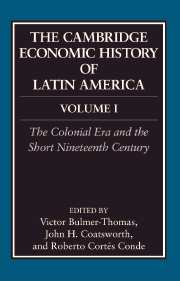Book contents
- Frontmatter
- Introduction
- Part I The Economic Background
- Part II Natural Resources and Factor Endowments
- Part III Economic Organization and Sectoral Performance
- 7 Political Economy and Economic Organization
- 8 Agriculture and Land Tenure
- 9 The Mining Industry
- 10 Premodern Manufacturing
- 11 Commercial Monopolies and External Trade
- 12 Money, Taxes, and Finance
- Part IV The Economic Impact of Independence
- Bibliographical Essays
- Index
- References
10 - Premodern Manufacturing
from Part III - Economic Organization and Sectoral Performance
Published online by Cambridge University Press: 28 March 2008
- Frontmatter
- Introduction
- Part I The Economic Background
- Part II Natural Resources and Factor Endowments
- Part III Economic Organization and Sectoral Performance
- 7 Political Economy and Economic Organization
- 8 Agriculture and Land Tenure
- 9 The Mining Industry
- 10 Premodern Manufacturing
- 11 Commercial Monopolies and External Trade
- 12 Money, Taxes, and Finance
- Part IV The Economic Impact of Independence
- Bibliographical Essays
- Index
- References
Summary
The late industrial development of Latin America poses important questions for the study of early manufacturing in the region. A central theme addressed directly or indirectly by the literature on the topic is the differences between the evolution of manufacturing in Latin America and in regions such as Europe and North America that industrialized earlier. To what extent does Latin American economic backwardness in terms of industrial development have its roots in the colonial era and the early post-colonial period? How was manufacturing in Latin America affected by colonial policies? What other factors account for its stagnation?
At first glance, one may assume that compared to Europe or North America very little manufacturing was undertaken in Latin America before 1850. Spanish and Portuguese colonial policies did limit the development of manufacturing in the region, but the further we study the topic the more we find that colonial regulations were flexible enough to allow some manufacturing to take place when the demand for particular goods could not be adequately supplied by the metropolis. Moreover, certain products manufactured in Latin America were central to colonial trade and thus promoted by the colonial governments.
Given the vast geographical extent of Latin America and its profound physical and historical heterogeneity, it is difficult to make general statements about the region as a whole. Manufacturing developed in different ways throughout Latin America depending on natural resource endowments, transportation costs, and the composition of the population.
- Type
- Chapter
- Information
- The Cambridge Economic History of Latin America , pp. 357 - 394Publisher: Cambridge University PressPrint publication year: 2005
References
- 2
- Cited by



